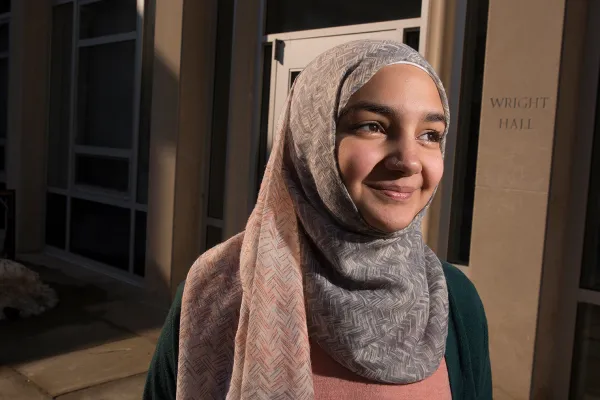Campaign Impact: Leadership Centers Boost Real-World Learning
Campus Life

Published March 11, 2017
Changing the world can begin with a single decision.
That happened for Khulood Fahim ’19 when she decided to get involved with the Lewis Global Studies Center. Programming at the center inspired her to become a campus leader on international issues, including co-founding a student organization to support refugees.
“Being involved in the center has allowed me to hold positions that complement and deepen my interests,” Fahim says. “I’ve been able to learn about and discuss important issues from around the world, and as an international student, feel supported in every way.”
Fahim’s experience underscores the transformative impact of Smith’s leadership programs—one of the key legacies of the Women for the World campaign. Campaign donations have enabled four leadership centers—Global Studies; the Center for the Environment, Ecological Design and Sustainability (CEEDS); the Wurtele Center for Work and Life; and the Jandon Center for Community Engagement—to become fully endowed resources for fostering interdisciplinary learning and women’s empowerment.
Significant campaign gifts have also supported Smith’s Lazarus Center for Career Development, the Viola J. Spinelli 1947 Quantitative Learning Center, the Sherrerd Center for Teaching and Learning and the new Jill Ker Conway Innovation and Entrepreneurship Center.
Each center operates in its own way to help students take full advantage of Smith’s curriculum. From studying the Mill River ecosystem to creating digital narratives about first-generation college women, the centers offer students new pathways for linking classroom work with meaningful applications.
The CEEDS-envisioned 260-acre Ada and Archibald MacLeish Field Station, for example, has rapidly become a hub for scholarship on climate change and sustainability. Developed in collaboration with students, the station has hosted research projects, performances and challenge-course experiences for hundreds of students and faculty.
Joanne Benkley, assistant director of CEEDS, says the center provides Smith students and faculty with new ideas in teaching and learning about environmental issues. “We encourage people to integrate their thinking about sustainability,” she says. “It’s about sharing understandings across disciplines.”
The centers have built on Smith’s existing strengths, including a history of innovation in global education. With upward of 40 percent of all Smith students now spending part of their college experience abroad, the Phoebe and John D. Lewis Global Studies Center has become a vital resource for teaching about languages, cultures and pressing humanitarian challenges such as environmental destruction and forced displacement.
Smith’s centers also play a role in expanding conversations about women’s leadership. The Wurtele Center, founded in 2010 and named for Margaret Von Blon Wurtele ’67 as a resource for work/life balance, is now promoting reflection and resilience in women’s lives through offerings like public speakers, op-ed workshops and leadership teas.
Stephanie Pinedo ’18 says being part of the Wurtele Center’s new first-gen leadership program has sparked a passion for “inclusion work” she hopes to pursue after she graduates. “I feel like I can more effectively communicate about first-gen issues within the Smith community and with others,” Pinedo says.
The campaign has enabled the centers to partner across disciplines and departments. Named for the late Jane Grossman Cecil ’50 and her husband, Don, the Jandon Center for Community Engagement has expanded its urban education and STEM outreach initiatives and connected with Smith’s other leadership centers to support student and faculty work with new refugees. “Working together benefits our focus on community engagement,” says Jandon Center Director Denys Candy. “We look forward to many more collaborations.”